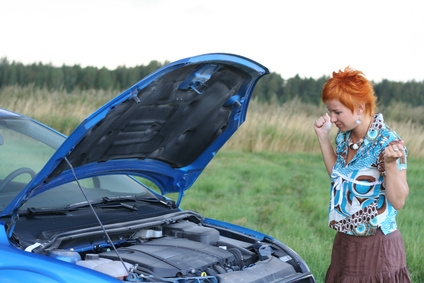
Having a basic knowledge of automobile troubleshooting can save a lot of time and money spent on diagnostics when something appears to be wrong with your car. One problem many drivers run into is a leaking radiator. The radiator holds the fluid used to cool the system. If it is leaking coolant, then it could lead to further car troubles. Knowing how to spot a leaky radiator could save your engine and spare your wallet.
The most obvious sign that a radiator is leaking is a lack of fluid in the coolant tank. Most vehicles have a plastic tank with a mark or indentation that indicates where the coolant level should be. If the coolant is well below this area, then it leaked out somewhere. The source is often the radiator. If you've noticed no other recent problems related to the cooling system, simply fill the reservoir back to the proper level and check it daily to see if the level moves. In a day or two the level will be back down again if there is a leak.
Antifreeze is typically what people use in their cooling systems, and the substance has an unmistakable odor. Once the car has had time to heat up after starting, the sweet, odd and unpleasant smell of burning coolant may become obvious if the coolant is leaking form the radiator and dripping on a part that gets hot during use. This could also indicate gasket trouble or a potential interior engine coolant leak.
In many instances, the reason people discover they have a leak in their radiators is the presence of an easily identifiable puddle under their cars. This substance is typically green or yellow in color and has a distinct sweet smell. Coolant should be cleaned up immediately as it poses serious health risks, including the potential for death in animals or children if ingested.
In the event that the driver of the car isn't overly observant when it comes to service and maintenance, overheating could result if there is a radiator leak. If the driver has not noticed any puddles or a smell, or he hasn't checked coolant levels, this may be the first warning he gets. When the temperature gauge on the car's dash rises to dangerous levels, the car should be pulled over and turned off immediately. An overheated engine can become badly damaged, and it could cost the driver far more money than just the expense of repairing a leaky radiator.